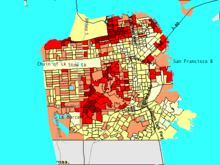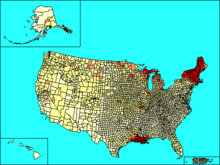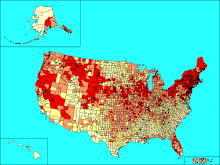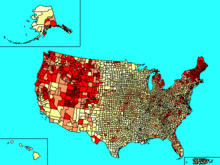User:Stevey7788/Maps
- About the maps -- please click here for detailed information on the maps.
The big project (please wait for the images to load — this may take a while) :
- Maps of San Francisco, California
- Maps of Oakland, California
- Maps of San Jose, California
- Maps of Los Angeles, California
- Maps of Chicago
- Ancestries of Americans
These thematic maps of San Francisco, California illustrate the different neighborhoods and the contrasting demographics of the diverse city. Please click on the images for a larger view or for more information on it. The images are generated at the U.S. Census Bureau's American Factfinder. ([1])
Racial and ethnic groups
[edit]



Age and sex
[edit]
Economy
[edit]




See also
[edit]
These thematic maps of Oakland, California illustrate the different neighborhoods and the contrasting demographics of the diverse city. Please click on the images for a larger view or for more information on it. The images are generated at the U.S. Census Bureau's American Factfinder. ([2])
Racial and ethnic groups
[edit]
Age and sex
[edit]
Housing
[edit]
Economy
[edit]
See also
[edit]
These thematic maps of the San Jose, California metropolitan area illustrate the different neighborhoods and the contrasting demographics of the diverse city. The San Jose East Side consist of poor, notoriously crime-ridden neighborhoods consisting mostly of Mexican immigrants. On the other hand, the affluent western cities of Cupertino, Saratoga, and Palo Alto are upper-class Asian communities with housing worth $900,000 or so. Many residents in western Santa Clara Valley work in San Jose's computer industry.
Please click on the images for a larger view or for more information on it. The images are generated at the U.S. Census' American Factfinder. ([3]) The geographic limit is the block group (BG) level.
Racial and ethnic groups
[edit]
Asians
[edit]
Age and sex
[edit]
Housing
[edit]
Economy
[edit]
Area of industry
[edit]
Tranportation and utilities access
[edit]Social characteristics
[edit]
See also
[edit]
These thematic maps of Los Angeles, California illustrate the different neighborhoods and the contrasting demographics of the diverse city. South Los Angeles, East Los Angeles, Long Beach, Hollywood, Santa Monica and parts of the San Gabriel Valley (including Monterey Park) are focused on, while the San Fernando Valley is not shown because of space limitations.
The maps reveal that the section of South Los Angeles around Interstate 110 ([[the Harbor Freeway), along with East Los Angeles and Boyle Heights, are the poorest areas in the Los Angeles metropolitan area. The area is approximately one-thirds African American and two-thirds Latino. Historically a segregated black community, the region is now home to many new Latino immigrants, many of whom arrived illegally because of the labor demand from the factories in Vernon and Commerce. The area is stricken by high rates of poverty, crime, and lack of education.
Please click on the images for a larger view or for more information on it. The images are generated at the U.S. Census' American Factfinder. ([4]) The geographic limit is the census tract (CT) level.
Racial and ethnic groups
[edit]
Social characteristics
[edit]

Age and sex
[edit]
Housing
[edit]
Economy
[edit]
Area of industry
[edit]
Tranportation and utilities access
[edit]
See also
[edit]These thematic maps of Chicago, Illinois illustrate the different neighborhoods and the contrasting demographics of the diverse city. Please click on the images for a larger view or for more information on it. The images are generated at the U.S. Census' American Factfinder. ([5])
Racial and ethnic groups
[edit]

See also
[edit]
The majority of the 295 million American people currently living in the United States descend from European immigrants who have arrived since the establishment of the first colonies. Major components of the European segment of the United States population are descended from immigrants from Germany (15.2 percent), Ireland (10.8 percent), England (8.7 percent), Italy (5.6 percent), Scandinavia (3.7 percent) and Poland (3.2 percent) with many immigrants also coming from Slavic countries. Other significant european immigrant populations came from eastern and southern Europe and French Canada; few immigrants came directly from France. A large number of Americans (12.9 percent) are descended from African immigrants, the majority of whom were slaves. These numbers, however, are inaccurate as many citizens listed themselves as "American" on the census (7.2 percent).
Ancestry maps
[edit]- Note on the images: These maps are self-generated by Wikipedia user Stevey7788 at the U.S. Census Bureau's American Factfinder site ([6]). "West Indian," "Arab," and "Sub-saharan African" ancestries are not listed. These maps focus only on the European ancestries of white or Caucasian Americans.



















References
[edit]See also
[edit]
